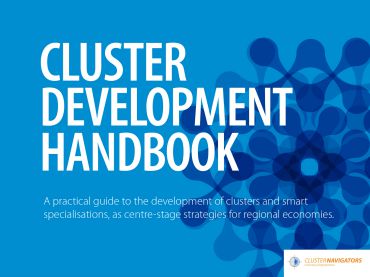Cluster Development Handbook
Who is the e-book for?
Cluster managers, public agencies, private sector organisations, academics, who:
- Want a comprehensive guide to establishing a successful clustering initiative;
- Want to revitalise a weak initiative;
- Want to lift a cluster to the next level of competitiveness.
Introducing the e-book
The first part of the handbook, ‘Setting the Stage’, explores ‘The What?’ and ‘The Why?’ of cluster development. It opens with an outside look at the natural phenomena of clusters and then takes an inside perspective on successful clusters, identifying common aspects. The next chapters explore three key dimensions in cluster development: business firmly in the lead, public agencies in support and academic underpinning. The organising of cluster interventions is explored, with chapters on successful clustering initiatives, the cluster organisation and the cluster manager. Advice for new cluster managers is presented.
The second part of the handbook, ‘Cluster Development in Practice’, identifies in detail ‘The How?’ of cluster development, dividing the journey into a series of Twelve Steps. These steps include cluster identification, cluster analysis, the cluster’s governance board and measurement & evaluation. The process can be used for kick-starting a new clustering initiative and for revitalising.
Click here for a detailed Table of Contents.
For cluster organisations and cluster managers
- Twelve Step framework for cluster development
- Summary tips for each step
- Characteristics of successful clustering initiatives
- Cluster manager profile
- Challenges in cluster development
- Analysis frameworks, check lists
- Establishing the Governance Board
- Energising through CATs … Cluster ActionTeams
- Clustering initiatives at risk
- Advice to cluster managers
For businesses, industry associations, chambers of commerce
- Business in the lead
- Strong clusters, strong businesses
- Benefits to business
- Roles in cluster development
For governments and public agencies
For national and regional economic development agencies
- Cluster origins
- Regional specialisation v. diversification
- Preconditions to a clustering initiative
- Public agency support; evolving role over time
- Segmenting innovative clusters
- Industry parks and incubators
- Cluster life cycle stages
- Designing cluster interventions
- Cluster identification & prioritisation
- Building agency alignment
- Measurement and Evaluation
- Cluster sponsors identified in 75 countries
For academia: tertiary institutions, vocational training, public R&D and high schools
- Examples of academic involvement
- Knowledge underpinning, active engagement
- Alignment with local absorptive capacity
- Linking with global knowledge centers
About the author
Ifor Ffowcs-Williams is the CEO, Cluster Navigators Limited, Nelson, New Zealand.
Since establishing Cluster Navigators in 1997, Ifor’s focus has been on the practicalities of cluster development. He leads strategy workshops around the world with economic development agencies, cluster groups and support organisations. Ifor is a frequent speaker on competitiveness, clusters and innovation.
The Twelve Step cluster development training workshops that Ifor leads have been attended by 4,000 participants from fifty countries. He has been described as ‘one of the most influential cluster practitioners in the world’. Clients include The World Bank, UNDP, international aid agencies and national & regional economic development agencies on five continents.
Ifor is a Founder and Past President of The Competitiveness Institute, the leading global network for practitioners, policy makers and business leaders addressing regional competitiveness.
www.linkedin.com/in/clusterdevelopment
What people are saying
Dr. Christian Ketels, Harvard Business School and President, The Competitiveness Institute:
‘A truly global traveller, Ifor has worked with cluster groups around the world, gaining insights on what works, and what doesn’t. The book opens the door into his uniquely broad treasure chest of experiences. It will be hugely valuable to cluster initiative managers all over the globe.’
Nigel Gwynne-Evans, Director, Manufacturing Industry Development, Cape Town, South Africa:
‘Without the wisdom and guidance of Ifor, and the practical approach as contained in the 12-steps, we would almost certainly not have gained the traction that we have. This book will fill an important gap in the cluster literature, and will be invaluable to any practitioner interested in the “art” of clustering.’
Contact jennie@clusternavigators.com for further information, quantity discounts or an invoice in a different currency.
Note: Consultations can also be arranged via Skype @ a rate of €125.00 per hour.
Should a workshop be of interest, please feel free to contact us on jennie@clusternavigators.com or e4@clusternavigators.com

